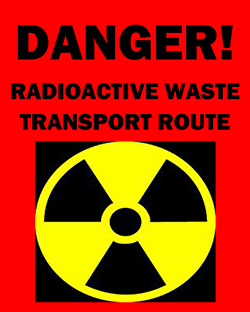Here is the link to the article:
But, only the first few sentences of this trade press publication article are readable before you hit the pay wall. (Sometimes, temporary free subscriptions are available, which can provide access to such articles.)
But what the headline and first few sentences make clear enough, though, is "fasten your seat belts." Yet again, a Democrat majority House Environment Subcommittee, and then Dem majority full U.S. House Energy & Commerce Committee, stand poised to re-introduce, hold hearings on, and vote to advance to the U.S. House floor, the Nuclear Waste Policy Amendments Act (now of 2021) -- the previous H.R. 3053, and H.R. 2699, of the past couple-three congressional sessions -- which would authorize consolidated interim storage facilities (CISFs). So, no rest for the weary!
Our side got blown out of the water on the House floor vote on H.R. 3053, on May 10, 2018, by a vote of 340 to 72! --
[This was significantly worse than our side did on May 8, 2002, when the U.S. House voted to override Nevada's veto of the Yucca Mountain dump by a vote of 306 to 117:
We did better on the U.S. Senate side on July 9, 2002 -- we "only" lost by a vote of 60 to 39, the best we've done on such votes in decades!]
Thank goodness, the U.S. Senate did not take up the bill, H.R. 3053, that session in 2018. We narrowly dodged a radioactive waste bullet that year.
But the very next session, the U.S. Senate did take up H.R. 2699, in the form of the identically worded S. 2917. AND a Dem majority Environment Subcommittee under Tonko, and a full U.S. House Energy and Commerce Committee under Pallone (D-NJ), passed H.R. 2699 by voice vote -- no recorded vote, a procedure normally reserved for "non-controversial" matters, like naming a post office! Luckily for us, the bill never made it to the full House floor, because the Nevada House delegation persuaded House Speaker Nancy Pelosi (D-CA) to stand with them in opposition to the Yucca dump (and H.R. 2699 was very pro-Yucca dump!).
Even with Pelosi's support in spring 2019, pro-Yucca forces nearly restored funding for the Yucca dump in the House Appropriations Committee process for the first time in a decade, due to four House Democratic committee members defecting. Our side only staved it off by a vote or two, thanks to a NV Republican, and another Republican who failed to show up for the committee vote! In short, our anti-Yucca congressional margin in the U.S. House, even with Pelosi's support, can be razor-thin!
So we can expect even a Democratic majority U.S. Senate to take up the Nuclear Waste Policy Amendments Act of 2021, if taken up in the U.S. House -- which Tonko says will likely happen in the near future!
CISFs are currently illegal under the Nuclear Waste Policy Act of 1982, as Amended, at least in conjunction with the U.S. Department of Energy taking title (ownership) and liability for the commercial irradiated nuclear fuel during transport to, and storage at, the CISFs, in the absence of an operating geologic repository. This is the heart of Beyond Nuclear's lawsuit against the Holtec NM and Interim Storage Partners TX CISFs. Don't Waste MI et al., Sierra Club, and Fasken Oil and Ranch, have also raised this illegality objection to the dumps, plus many other legal, environmental and safety contentions.
Here is the announcement of Beyond Nuclear's federal court appeal re: the violation of NWPA, filed on 2/10/21:
If not the Nuclear Waste Policy Amendments Act (which is more pro-Yucca dump than it is pro-CISF, but it is pro-CISF), then other CISF-authorizing legislation could come under active consideration this congressional session, as Subcommittee Chairman Tonko has indicated. Here is a chart of congressional legislation that likely will be re-introduced this session, including a number of pro-CISF bills:
[This chart needs updating -- there are additional pro-CISF bills that have been introduced since this chart's posting in Jan. 2020, including legislation introduced by U.S. Rep. Levin (Democrat-Southern CA).]
U.S. House Environment Subcommittee Chairman Tonko should know better. As Ranking Democrat at the time, he invited Beyond Nuclear to testify before the Environment Subcommittee on Oct. 1, 2015, re: the risks of high-level radioactive waste transportation, whether bound for a Yucca Mountain, NV dump-site, or CISF dump-sites:
Apparently, Tonko was NOT listening very carefully that day, nor did he very carefully read any of the written materials we provided him and the Subcommittee. Which is ironic, because his own congressional district would be hard hit by Mobile Chernobyls, if any of these Southwestern dumps (Yucca Mt., NV; Holtec, NM; ISP, TX) were to open.
While Biden Energy Secretary nominee Granholm has expressed opposition, on behalf of the administration, to the Yucca Mountain dump scheme, targeted at Western Shoshone land in Nevada, there has been no such explicit Biden administration opposition to the NM and TX CISFs expressed, as of yet. However, Biden Transportation Secretary Pete Buttigieg has expressed significant concern about the risks of high-level radioactive waste transportation bound for Yucca Mountain. But shipments bound for the CISFs in NM and/or TX will carry the same level of risks, as we testified to Tonko's subcommittee in 2015. More so actually, because CISFs multiply transport risks, unnecessarily and foolishly: the. first leg, from nuclear power plants, to the CISF(s); the second -- and unnecessary -- leg, from CISF(s), to permanent repository or repositories.
Time to get busy pushing back, people!
 admin
admin







